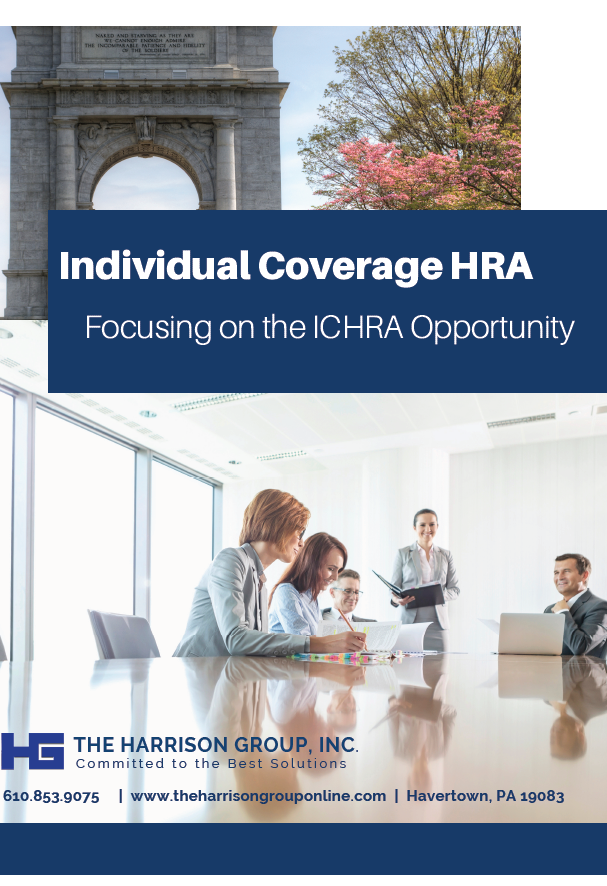Specialty Health Reimbursement Arrangements
There are several options for employer-funded, tax-deductible plans that may offer pre-tax assistance to employees toward the cost of individual health insurance premiums, as well as, out-of-pocket medical, dental and/or vision expenses. These HRA plans include:
Individual Coverage HRA
Excepted Benefit HRA
Qualified Small Employer HRA
HRA for Medicare
ICHRA: Individual Coverage HRA
What is an ICHRA?
An Individual Coverage Health Reimbursement Arrangement (ICHRA) is a newly formed plan under the Affordable Care Act (ACA) that permits employers to reimburse employees for the cost of individual insurance, as well as, medical care expenses. This new HRA is available for plan years on or after January 1, 2020.
An ICHRA is available to ANY size employer.
What are the employee insurance requirements?
Employees must be enrolled in INDIVIDUAL health insurance (or Medicare) for each month the employee (or employee’s family member) is covered by the Individual Coverage HRA. This may be individual health insurance offered on or off an Exchange.
Employees enrolled in a GROUP medical health plan or covered by a spouse’s group health plan are not eligible to participate.
Employees must be enrolled in INDIVIDUAL health insurance (or Medicare) for each month the employee (or employee’s family member) is covered by the Individual Coverage HRA. This may be individual health insurance offered on or off an Exchange.
Employees enrolled in a GROUP medical health plan or covered by a spouse’s group health plan are not eligible to participate.
Who may employers offer an ICHRA to?
Employers may either offer an ICHRA (or) a traditional group health plan but may NOT offer the same employees a choice between the two. The ICHRA may be a good choice for employers that either do not offer group medical, or, would like to offer a health benefit to employees that would not usually be eligible for group medical insurance.
The ICHRA must offer such coverage on the same terms to each participant within a permitted class. Employers can create classes of employees around certain employment distinctions, such as the following:
- Full-time employees
- Part-time employees
- Employees working in the same geographic lcoation
- Seasonal employees
- Salaried workers
- Non-salaried workers (such as hourly worker)
- And many more classifications…
There are minimum class sizes, such as:
- 10 employees, for an employer with fewer than 100 employees
- 10% of the total number of employees, for an employer with 100-200 employees
- 20 employees, for an employer with more than 200 employees
What is the maximum employer contribution for an ICHRA?
There is no minimum contribution required, nor is there a maximum annual reimbursement limit.
Employers that offer an ICHRA must do so on the same terms for all employees in a class of employees, but they may increase the ICHRA amount for older workers and for employees with more dependents.
What expenses are reimbursable under an ICHRA?
Employers may design the plan to reimburse individual medical insurance premiums and 213(d) medical expenses, or limit to premiums only.
Eligible premiums include:
- Individual health insurance premiums (on or off an Exchange)
- Medicare Parts A, B, C and D premiums
- Medicare Supplement premiums
- Certain insured student health plans
Additional resources available for download:

New HRA Opportunities for 2020
Click the button to download our comprehensive review of the Individual Coverage HRA and Excepted Benefit HRA.

Your Opportunity with an ICHRA
Click the button to download a review of the ICHRA that talks about the opportunity it presents for employers.
EBHRA: Excepted Benefit HRA
What is an EBHRA?
An Excepted Benefit HRA is a newly formed plan that permits employers to reimburse employees for the cost of Excepted Benefits such as vision and dental expenses, as well as, general medical expenses.
What are the employee insurance requirements?
Employees must be eligible for the employer’s group health plan (but need not be enrolled). The group health insurance plan does not need to be integrated with the EBHRA. A Healthcare FSA can be offered alongside an EBHRA.
Who may employers offer an EBHRA to?
EBHRAs must be available under the same terms and conditions to all similarly situated employees.
What is the EBHRA maximum employer contribution?
The maximum contribution for employers in 2025 is $2,150. Employers may choose to offer unlimited carryovers, which are not included in the annual limit.
What are the eligible expenses for an EBHRA?
Eligible expenses include premiums for Excepted Benefits, including vision and dental, 213(d) medical expenses, COBRA and short-term limited duration insurance (STLDI) premiums under certain circumstances.
EBHRA cannot reimburse individual medical insurance premiums or Medicare premiums.
QSEHRA: Qualified Small Employer HRA
What is a QSEHRA?
A QSEHRA is a Qualified Small Employer Health Reimbursement Arrangement. It is an employer-funded, tax-deductible plan that allows smaller employees (under 50 employees) to offer pre-tax assistance to employees toward the cost of individual health insurance premiums, as well as, out of pocket medical, dental and/or vision expenses.
Is your business eligible to offer the Qualified Small Employer HRA – QSEHRA?
-
Do you have less than 50 full-time employees?
-
Are you not currently offering a group health plan?
Why consider a QSEHRA?
Small Business Employer Cost Savings
Fewer than half of all small businesses offer group medical plans to their employees, mainly due to cost. Many of these employers are small, family businesses with employees who have access to group insurance elsewhere. The main reason to utilize a QSEHRA is to allow an employer to offer a way to offer tax-free assistance to employees toward the cost of their health insurance premiums, as well as, medical, vision and/or dental out of pocket expenses. Offering a QSEHRA provides assistance to employees without taking on the full burden and cost uncertainties of offering group health insurance. Eligible companies can now offer a standalone option to their employees, without being subject to the excise tax imposed by the Affordable Care Act. Also, HRS allocations not utilized by an employee revert to employer.
- Payroll Tax Savings (no FICA)
- Avoid Cost Uncertainties
- Budgetary Control Through Fixed Amounts
- Unused HRA Allocations Revert Back to Employer
Competitively Recruit Top Talent
Be competitive in the job market by offering this benefit and recruit and retain the best employees.
Employee Job Satisfaction, Morale and Retention
Benefits selected to help employees with out of pocket costs is shown to increase job satisfaction and improve retention rates for your employees.
What are the employer requirements?
A Qualified HRA must be offered to all eligible employees, on the same terms. However, certain variables can determine a larger benefit for certain employees, including:
- An employee’s age and/or
- Number of covered family members
- Price of an insurance policy in the relevant individual health insurance market
The following employees can be excluded:
–Less than 90 days of service with the company
–Under age 25
–Part-time or seasonal employee
–Union employees
–Non-resident aliens
- Premiums paid to purchase other health coverage, such as through a spouse’s employer plan, are not eligible for reimbursement under a QSEHRA.
- The maximum reimbursement allowed for 2025 under the Qualified HRA is $6,350 for the employee-only coverage or $12,800 for family coverage.
- Employees who receive HRA contributions in the small-employer category are ineligible for premium tax credits if the monthly premium for self-only coverage for the second-lowest-cost Silver Level (70% actuarial value) plan in their “relevant individual insurance market” is less than one half of 9.5% of the employee’s household income, minus the HRA premium contribution. If coverage is not affordable for the employee under this formula, they may qualify for a premium tax credit. However, it will be reduced by the amount of the HRA.
- An employee must maintain minimal essential coverage in order to take advantage of the tax benefit of the Qualified HRA. Otherwise, the employee reimbursements are subject to tax.
- Employees / Participants may not be eligible for subsidies under an exchange while they are covered under the employer’s HRA.
- The employer cannot offer group health coverage to any Employee.
- Employers must provide written notice to each eligible employee, which must include:
–Amount of the allowed benefit for the year, based on the Qualified HRA
–Statement that employees who choose to apply for advance payment of the premium tax credit for health insurance on the Marketplace, are required to inform the Marketplace of the amount permitted benefit under the Qualified HRA.
–Statement that if the employee is not covered under minimum essential coverage for any month, that employee may be subject to a tax under Code Section 5000A, and reimbursements under the Qualified HRA may be considered taxable income.
- The employer is responsible for funding 100% of the Qualified HRA.
- Employee salary reductions or contributions are not permitted.
- Employers must report the benefit available under the QSEHRA on each employee’s Form W-2. Additional IRS guidance on reporting is expected.
- Employers must verify that the employee is covered under either an individual or group health plan that meets the minimum essential coverage requirement of the ACA.
How Does QSEHRA Impact COBRA?
Qualified HRAs will not be considered as a group health plan for purposes of COBRA continuation coverage. Once employment is terminated or a qualifying event occurs, employers are not required to provide a COBRA notice or continued coverage under the Qualified HRA.
-
Do you have less than 20 employees including full-time and part-time?
Benefits selected to help employees with out of pocket costs is shown to increase job satisfaction and improve retention rates for your employees.
Medicare HRA
What is a Medicare HRA?
A Medicare HRA is an employer-funded, tax-deductible plan that allows smaller employees (under 20 employees) to offer pre-tax assistance to employees toward the cost of Medicare part B and D, as well as Medicare Supplements
A Medicare HRA is an employer-funded, tax-deductible plan that allows smaller employees (under 20 employees) to offer pre-tax assistance to employees toward the cost of Medicare part B and D, as well as Medicare Supplements.
Is your business eligible to offer a Medicare HRA?
-
Do you have less than 20 employees including full-time and part-time?
Benefits selected to help employees with out of pocket costs is shown to increase job satisfaction and improve retention rates for your employees.